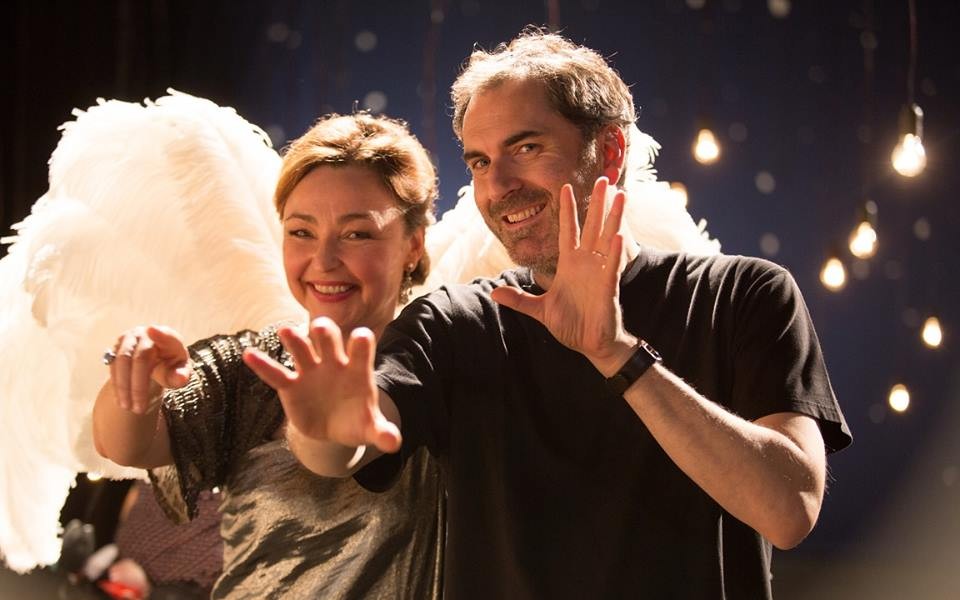Xavier Giannoli: An interview with the director of Marguerite

Xavier Giannoli is a César-nominated director. His latest film, Marguerite, tells the story of a French Baroness in the 1920s who believes herself to be a very talented and accomplished opera singer, despite being tone deaf. We caught up with the director to find out more.
How would you sum up the film for someone who hasn’t heard of it?
We all need illusion to stay alive.
How would you describe the main character, Marguerite?
Lonely and in need of love.
Are you a fan of opera?
Of course I like opera, I like the spectacle of the show: the beauty, the music, the human beings with important feelings about love and death. I like the idea that in cinema you can have something from the opera, you can have this idea of the big show and of something with colours, with sounds, with beautiful dresses. That’s my ambition in the film.
You cast three incredible actors who are also experienced stage performers: Catherine Frot, André Marcon and Michel Fau. Can you tell us about them?
I’m obsessed with the actors when I’m writing. I’m trying to tell stories about human beings, so the most important special effect for me in cinema is the beauty of an actor: his or her emotions. I don’t want to film the people that everyone’s filming; celebrity status is so boring for me and it’s very important to catch new actors. Michel Fau and André Macon are only in a few small films, which aren’t really on the map. Even with Catherine, my ambition was to catch something new, something that nobody had ever filmed on her face. They are amazing actors and it was such pleasure for me to work with them, every day was like fireworks. I hope that the audience feel that.
You’ve said that your inspiration for Marguerite came from Florence Foster Jenkins, the American socialite soprano. In what way did her story catch your attention and inspire you?
I was listening to the radio, more than ten years ago, and I suddenly I heard her voice singing Queen of the Night; it was as if someone was strangling Mozart’s parrot. It was so funny and the radio presenter said that this woman had sung in Carnegie Hall, in front of a huge crowd. Immediately, I thought it was an amazing story – a rich woman obsessed with opera singing completely off-key – and I imagined her singing in front of a huge crowd. I wanted to know everything about her.
At the very beginning of the film, when you first hear her singing, it’s completely awful and you are on the side of the people laughing. After 90 minutes, you can hear exactly the same voice but you are now on her side, because you know that in the problem of her voice there is the problem of a woman: the need for love, the need for freedom, for art, for sex, for everything.
It would have been easy to treat Marguerite as a joke and devote the film to mocking her, yet your depiction is far more sympathetic. Was this a conscious decision?
Of course. I made a film with Gerard Depardieu, The Singer, and it was the same idea. The first time you see him, he’s just a stupid, old-fashioned ballroom singer in a casino. The beauty of cinema for me is that at first glance he’s just a stupid guy, and the first time you hear her she’s just comic and ridiculous, but the camera expresses that she’s a human being. There is a paradox, and that’s the beauty of life and of cinema.
How did Dada influence your film?
Not a lot of people are interested in Dada. What genius, it’s so boring today! I’ve had an interest for a very, very long time and as you can see in my film, Kyril is exactly Tristan Tzara. The first time I heard Florence Foster Jenkins’ voice, I immediately thought of an artist’s performance. I started to think about what is art and what is absurd. There is something true about Dada, it’s Marguerite’s moment of artistic liberty; there is something absurd but also something alive. But most importantly there is something funny, there is something about what it is to love, about provocation and about freedom. This woman is more than 50 years old and she is like a prisoner in the chateau. These young men come along and she is like a muse for them, because she’s stronger than them and she’s the expression of everything they are looking for. There’s a mix of freedom and energy and humour.
What was the most difficult thing during the writing process and the greatest challenge during the actual production?
The most difficult thing was that everything in this character looks ridiculous. All my work was to make her human. With every film, I can’t start to write unless I feel this very simple idea: that nobody would believe it. For me, the most important film I’ve done is In the Beginning. It’s set in Northern France and it’s the story of a small-time crook who pretends to be an engineer working for the government, who builds two kilometres of motorway before they realise he’s a fake. How is it possible today that that happened? I start to write when I feel that nobody will believe it, that’s where I need to work to make it real. I need to investigate something very simple, very basic, and then I need imagination. The most challenging thing was to make people believe that the story was possible and to create something emotional about this ridiculous voice.
Let’s talk about the cinematography: it’s a decadent setting but it’s quite polished. What did you have in mind?
I work with an amazing cinematographer, a Belgian living in LA, who had a beautiful idea. He found some very strange lenses from the 50s, a real cinemascope. He asked Panavision in LA to polish the lenses with diamond powder, so when the camera passes the light there is a strange feeling, a flare. It was important that everything in the film feels completely real, like a documentary, but these lenses gave a sense of something more than reality. I’m obsessed with the movement of the actors in the frame. It’s very sensual to have male and female bodies together and it’s like the theatre. When you see something in cinema there is more than what is on screen, there is an emotion and there is something about space and bodies that expresses something deep about the characters.
Catherine says you sent her a copy of the book Les Tragédiennes de l’Opéra: de Rose Caron à Fanny Heldy, le Feu Sacré des Déesses du Palais Garnier 1875-1939. How did you want her to prepare for it? Did she get singing lessons?
Catherine decided to take some singing lessons and it was a nightmare for me, because that’s the opposite of what I wanted. I told her: “Of course I don’t want you to know how to sing!”. It was very complicated, very dangerous and very difficult for her voice, because during Queen of the Night, for example, you need to be a soprano coloratura to reach the notes. We ended up with a voice double, so there was an opera singer on the set all the time giving her a lot of advice about how to stand when singing. She’s not supposed to be an innocent child, she’s working for hours every day. If you just see her, without hearing her voice, she’s a real opera singer. A really important moment was three days before shooting, when we took all the pictures of her in the different costumes, and suddenly the character was alive.
Catherine Phipps
Marguerite is released in selected cinemas on 18th March 2016.
Watch the trailer for Marguerite here:

























Facebook
Twitter
Instagram
YouTube
RSS